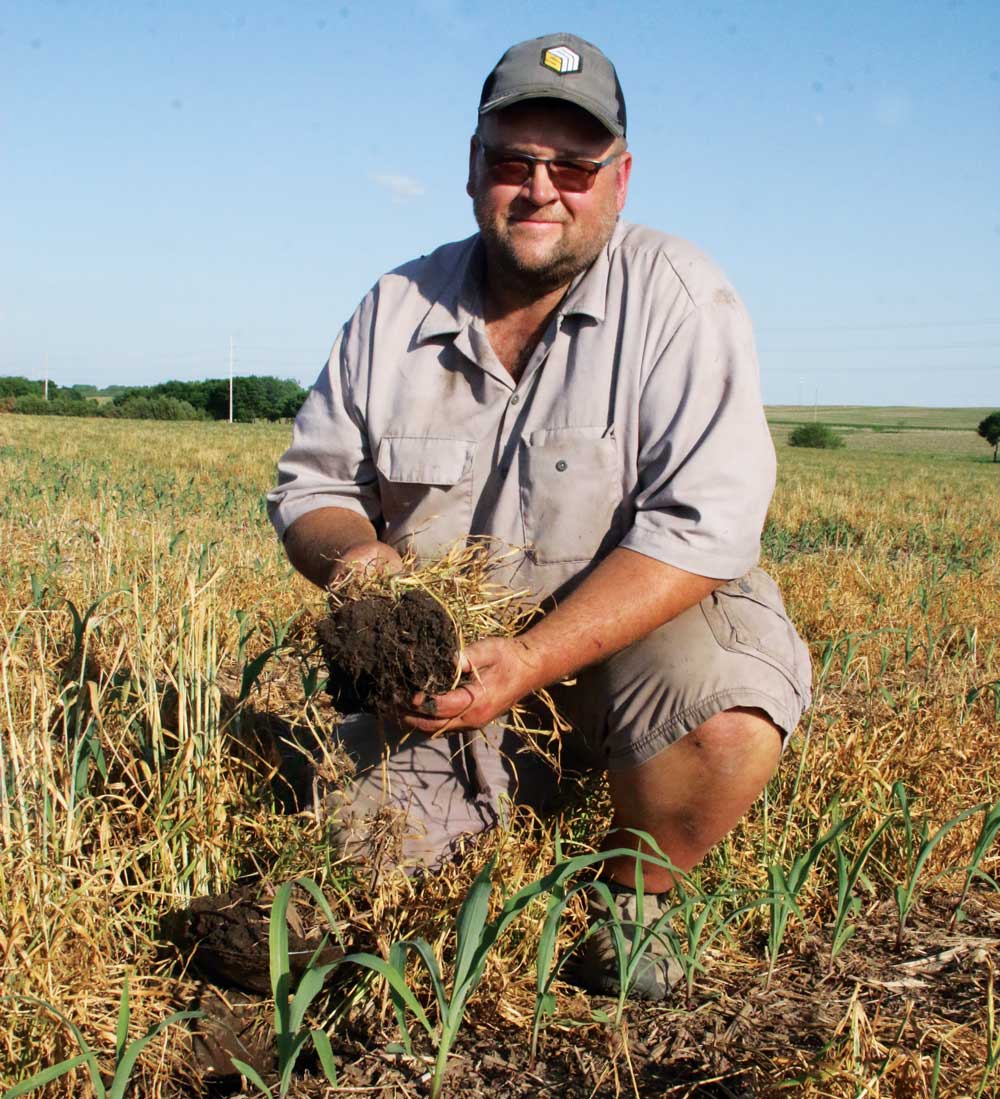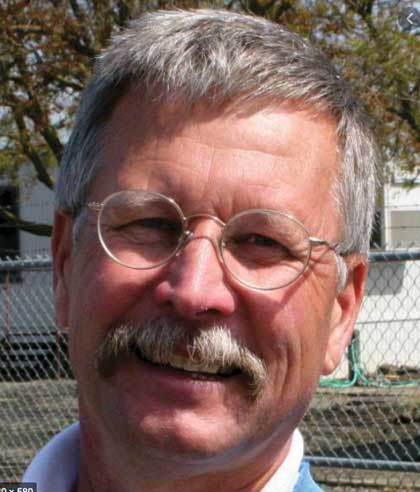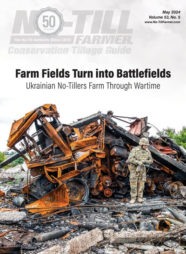Three individuals and one organization are being recognized as the 25th class of No-Till Innovators for their commitment to the advancement of no-till farming systems in North America and worldwide.
The No-Till Innovator Award program — sponsored by Calmer Corn Heads and No-Till Farmer — strives to honor farmers, researchers, businesses and services, and organizations for their work in assisting the growth of no-till practices, regardless of the types of crops or equipment used.
The 2020 honorees are:
- • Jeffrey Mitchell — Cooperative Extension specialist, University of California-Davis; Research & Education
- • Loran Steinlage — West Union, Iowa no-tiller, Crop Production
- • Exapta Solutions — Business & Service
- • Practical Farmers of Iowa — Organization
NTIA Selection Committee
- Jim Hersey — Elizabethtown, Pa.
- Betsy Bower, Ceres Solutions — Lafayette, Ind.
- Joe Nester, Nester Ag — Bryan, Ohio
- John Dobberstein, Senior Editor — No-Till Farmer

Loran Steinlage, Crop Production
Loran Steinlage operates Flolo Farms near West Union in northeastern Iowa. The 750-acre farm sits on the edge of the ‘Driftless Region’ of Iowa, an area known for its unique topography and coldwater streams.
The Driftless Region is a small region of northeast Iowa, southwest Wisconsin and southeast Minnesota missed by glaciers during past ice ages, creating a unique landscape. The high-relief topography and mixture of soil types creates challenges for producers in the area, including Steinlage.
Steinlage recognized long ago that the location of his farm was unique and implementing sustainable management practices such as no-till was critical to keeping his farm productive long into the future.
Steinlage quit tillage 20 years ago and soon began implementing cover crops as well. Today, Steinlage is considered one of the most innovative producers in Iowa and is recognized for his ability to ‘push the envelope’ with equipment adaptations, interseeding of cover crops and diverse crop rotations.
Steinlage is always looking for ways to continue to improve soil health, increase water infiltration and sequester carbon in his fields. Steinlage’s efforts are helping other farmers in the region implement management practices that help protect the environment and reduce the impact of frequent flooding.
“Perhaps what sets Steinlage apart the most from other producers is his wiliness to share ideas and techniques with others,” says Ross Evelsizer, watershed planner and GIS specialist for Northeast Iowa Resource Conservation and Development.
“While some farmers hesitate with sharing ideas for fear of competition or simply being an outcast, Loran has embraced the idea of sharing and helped build a network of thousands of producers on social media that spans a vast geographical area.”
Steinlage spends the ‘offseason’ traveling with his wife, Brenda, to speaking engagements around the world, sharing regenerative techniques and ideas that he’s implementing.
Last year, Steinlage spoke in Canada, Europe, Australia and several states in the U.S. He was one of the first producers to try relay cropping in Iowa and helped start the Multi-Cropping Iowa project with Northeast Iowa Resource Conservation & Development.
Multi-cropping Iowa now has a global following. The project is helping producers understand more about multi-cropping by learning from producers like Loran, exploring alternative markets for crops such as craft beer production, and developing equipment that works for multiple crops.
Steinlage also uses his mechanical skills to assist Dawn Equipment/Underground Ag develop agricultural implements specifically for regenerative management.
“A lot of what we’re working on right now comes from trying to figure out what worked in the past and tie it together with the technology we have available today,” Steinlage says. “Everybody thinks we need special equipment. We don’t. We just need to figure out how to build the right tools that are versatile.”
Steinlage’s real passion is engaging youth in activities related to agricultural production and teaching young people about conservation production methods, Evelsizer says.
Steinlage has a greenhouse that he’s provided as an on-the-farm lab for local 4H students to try out ideas for projects. He has actively helped with school field trips and helped coordinate outreach between conservation and agricultural professionals and students.
Steinlage continues to think of ways to engage more young people in on-farm activities and be a positive influence on area youth.

Exapta Solutions, Business & Service
The idea for Salina, Kan.-based Exapta Solutions was born after Matt Hagny migrated to Kansas in 1993 and started offering crop consulting and agronomy services for no-tillers.
He also offered custom no-till seeding from 1994 to 2001, which provided him with both frustrations and insights for better methods of no-till seeding.
Hagny founded Exapta Solutions in 1998 with the vision of providing better tools for no-till seeding. To this day, Exapta’s forte is in understanding how plants grow, and how the no-till seeding process can be more effectively accomplished.
Chief of operations Leah Lanie says Exapta strives not to sell a device, but to provide useful information so that customers can get the most out of their seeding equipment — more acres, better emergence, higher yield, and greater profit.
Hagny traveled the globe, both as a consultant and a student of no-till and learned from some of the best. He conducted highly acclaimed seeding schools every year to assist producers in better understanding all aspects of no-till seeding equipment, ranging in subject matter far beyond Exapta products.
“Matt was a factual straight shooter, not a salesman,” Lanie says. “Matt’s expertise was always backed up by science.”
Hagny also had written numerous educational articles about the fundamentals of no-till, no-till seeding, effective equipment, improvements and more to help inform no-tillers for success.
Unfortunately, Exapta Solutions lost its founder in 2019 when Hagny died during a mountain-climbing accident in Colorado. Although his passing was a major jolt, the company’s management is determined to carry on Hagny’s legacy and continue advancing no-till practices worldwide.
“It was never about Exapta’s bottom-dollar for Matt, but only what was best for the customer’s success. That is truly honorable,” Lanie says.
“I’m extremely honored and humbled receiving this award, and I just wish that Matt was here to receive it,” says Hagny’s sister, Emilie Downs, who succeeded Matt as the company’s CEO. “I think it’s truly a testament to his work over the last 25 years.”

Jeffrey Mitchell, Research & Education
Jeffrey Mitchell serves as a Cooperative Extension specialist for the University of California-Davis, where he’s been a pioneer in design, research, knowledge generation and extension in conservation cropping systems in California.
The idea of conservation tillage and high-residue farming is still a vigorously challenged idea in California, while the rest of the world is practicing these systems. But Mitchell has worked diligently on these systems, unfettered by the challenges and opposition.
With his dedication, these conservation cropping systems are now beginning to be gradually adopted in California and are receiving much attention from growers, extension, industry, educational institutions, state and Federal government agencies, and non-governmental agencies, says Anil Shrestha, chair of the department of Viticulture and Enology at Fresno State University.
Initially, Mitchell established the University of California Conservation Tillage Workgroup that was primarily focused on no-till systems. Later, he expanded the workgroup and established the Conservation Agriculture Systems Initiative (CASI) group with a broader conservation systems approach. CASI won the No-Till Innovator Award in 2018.
“I don’t think it would be an exaggeration to state that this is now one of the strongest Extension education programs in California, which goes beyond a traditional Cooperative Extension program as Jeff has brought together people from multiple agencies mentioned above,” Shrestha says.
Mitchell expanded his work to vegetable crops and is among the first in the U.S. to work on these systems combined with precision irrigation technology. His long-term research site at Five Points, Calif., has generated a wealth of knowledge in applied conservation systems, and growers, scientists, regulators, industry and NGO employees, and students from various institutions of California are frequent visitors to this site.
The site has provided an opportunity for graduate students from several California universities to complete their thesis work, and undergraduate students to obtain knowledge as interns. Several of these interns have continued on to graduate school due to their experience at the site.
Mitchell has also initiated research projects on precision overhead irrigation systems, combined with conservation tillage and high-residue systems with strategic crop rotations.
Mitchell organizes the CASI Workgroup Field Days and Demonstrations at the University of California West Side Research and Extension Center, which are among the most highly attended Extension events. “It’s not just the numbers of Extension events, but the quality of these events is also very high,” Shrestha notes. “Jeffrey is an excellent speaker which adds value to these events.”
Mitchell’s voluntary and community service record also is noteworthy. He has volunteered in several local community events, “but what is outstanding is his effort to take the value of agriculture and conservation education efforts to K-12 students,” Shrestha says.
“He is one of the hardest-working people I have ever worked with. I have not seen anyone more dedicated to delivering services to growers. I’ve seen him drive long distances to deliver equipment and supplies to growers and to other extension agents. These are qualities that make him a great Extension educator.”
An important part of Mitchell’s research and education efforts has emphasized evaluations of the impacts and tradeoffs that reduced disturbance tillage and cover cropping have on soil and cropping system function.
Based on a long-term study dating to 1999, Mitchell worked with a team that documented that no-till and cover crop practices in sorghum, cotton, corn, wheat and tomato could not only maintain productivity, but also greatly impact a number of important soil quality indicators — including higher soil carbon and nitrogen (N), aggregation and infiltration.
This work has been the first such long-term study to test the coupled impacts of no-till and cover-cropping practices on soil properties in California and it has now documented that significant positive changes have occurred even in the arid, irrigated soils in the San Joaquin Valley.

Practical Farmers of Iowa, Organization
Headquartered in Ames, Iowa, Practical Farmers of Iowa (PFI) was founded in 1985 as an organization for farmers. PFI uses farmer-led investigation and information sharing to help them practice an agriculture that benefits both the land and people.
PFI’s mission is equipping farmers of all types to build resilient farms and communities. Farmers in PFI’s network raise corn and soybeans, hay, livestock large and small, horticultural crops from fruits and vegetables to cut flowers and herbs, and more. The organization boasts more than 4,000 members and interacts with 70-100 researchers annually to conduct research projects.
Members have conventional and organic systems, employ diverse management practices, run operations of all sizes and come from a range of backgrounds. These farmers come together, however, because they believe in nature as the model for agriculture and are committed to moving toward sustainability.
Stefan Gailans, PFI’s research and field crops director, heads up the on-farm research program, also known as the cooperator’s program. Together with “curious and creative farmers,” PFI helps farmers design and execute experiments on their farms based directly on challenges they’re facing.
“Practical Farmers of Iowa was founded in the spirit of environmental stewardship and profitability,” Gailans says. “So a number of our experiments that the farmers design and conduct on their farms usually have some kind of conservation or stewardship ethic.”
That could mean learning how to reduce tillage, or adopt or manage cover crops to have living roots in the ground year round, “and farmers are seeing how they can implement those kinds of soil improvements, soil health, or soil conservation practices,” he says.
On a yearly basis, PFI has about 50-60 farmers, or “cooperators” as PFI calls them, that partake in some kind of on-farm research. Gailans says farmers typically drive what topics or challenges are addressed in the research work.
“We employ the principles of replication and randomization of treatments, just as a researcher at an academic institution would do, so it adds a level of commitment on their part.”
PFI publicizes and promotes the results of these trials in research reports, videos, blogs, podcasts, and through field days or events that PFI organizes.
Of late, cover crop and soil health topics and 60-inch-row corn systems have seen major interest from members, although PFI has also tackled foundational agronomic topics such as hybrid and variety trials, livestock and pasture management, and financial analysis and enterprise budgeting.
“The Cooperators’ Program has become especially valuable to the farmers partaking in it, but also the rest of our membership. Our mainstay is farmer-to-farmer knowledge sharing.”








Post a comment
Report Abusive Comment